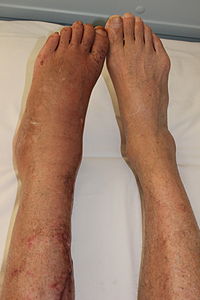
Photo from wikipedia
Objective Cigarette smoking and musculoskeletal pain are prevalent among Department of Veterans Affairs (VA) health care system users. These conditions frequently co-occur; however, there is limited empirical information specific to… Click to show full abstract
Objective Cigarette smoking and musculoskeletal pain are prevalent among Department of Veterans Affairs (VA) health care system users. These conditions frequently co-occur; however, there is limited empirical information specific to Afghanistan/Iraq era veterans. The present study sought to examine gender differences in the association between cigarette smoking and moderate to severe musculoskeletal pain in US veterans with Afghanistan/Iraq era service. Methods A random sample of 5,000 veterans with service after November 11, 2001, participated in a survey assessing health care needs and barriers to care. One thousand ninety veterans completed the survey assessing post-traumatic stress disorder (PTSD) symptoms, depressive symptoms, and current pain severity. Multivariate logistic regression was used to examine the association between gender, cigarette smoking status, and current moderate to severe musculoskeletal pain. Results Findings indicated a significant gender by smoking interaction on moderate/severe musculoskeletal pain, adjusting for age, self-reported race/ethnicity and weight status, combat exposure, probable PTSD, depressive symptoms, service-connected injury during deployment, and VA health care service utilization. Deconstruction of the interaction indicated that female veteran smokers, relative to female nonsmokers, had increased odds of endorsing moderate to severe musculoskeletal pain (odds ratio [OR] = 2.73, 95% confidence interval [CI] = 1.16-6.41), whereas this difference was nonsignificant for male veterans (OR = 1.03, 95% CI = 0.69-1.56). Conclusions Survey data from Operation Enduring Freedom/Operation Iraqi Freedom veterans suggest an association between current smoking, gender, and moderate to severe musculoskeletal pain. The stronger relationship between smoking and pain in women supports the need for interventional and longitudinal research that can inform gender-based risk factors for pain in veteran cigarette smokers.
Journal Title: Pain Medicine
Year Published: 2017
Link to full text (if available)
Share on Social Media: Sign Up to like & get
recommendations!